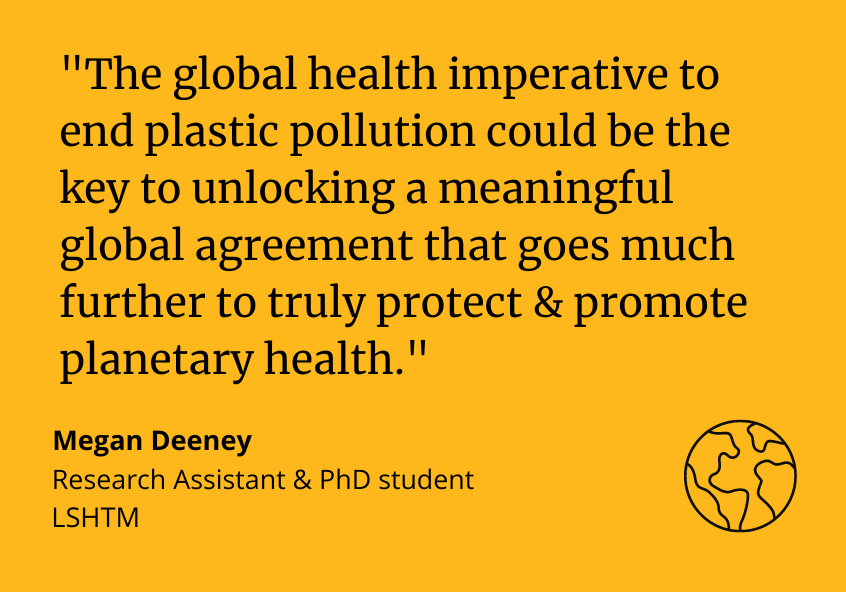We need to stop stalling and address plastic pollution now
London School of Hygiene & Tropical Medicine https://lshtm.ac.uk/themes/custom/lshtm/images/lshtm-logo-black.png Monday 5 June 2023
Today, World Environment Day 2023 is all about tackling plastic pollution. This is timely not least as countries around the world emerge from a week of international negotiations as part of the development of a global, legally binding, treaty to end plastic pollution. Plastic is now so pervasive in our environment as to constitute a new era: the Plasticene. Each minute, a truck load of plastic enters our oceans and microplastics permeate soils, seas and even the Arctic environment. Plastic pollution, in all its forms, is responsible for countless human deaths and disease, disproportionately affecting already disadvantaged communities and driving legacy intergenerational effects. The global health community has a critical role to play in this planetary crisis, by providing evidence of health impacts and mitigation strategies that leaves decisive action against plastic pollution non-negotiable.
Booming global plastic production and insufficient waste management is driving staggering rates of pollution. This year alone 390 million metric tonnes of plastics waste will be generated globally, more than 40% of which will be mismanaged, ending in unregulated dumpsites, open burning, and environmental pollution. Macroplastic pollution is being implicated in the loss of livelihoods and contributing to poor water, sanitation and hygiene related diseases. Broader still, human health is affected by all forms of pollution generated throughout the plastic life cycle. Global virgin plastic production and open burning emit billions of tonnes of greenhouse gases and air pollutants each year, contributing to the health effects of climate change, cardiopulmonary disease and lung cancer. The health consequences of microplastics, which have now been identified in lung tissue, placenta and blood samples, are of increasing concern along with the alarming list of toxic chemical additives exhibiting carcinogenic, neurotoxicological and endocrine-disrupting effects. Added to this a new report is drawing attention to the possible health damages of plastic recycling, one of the key strategies proposed to address plastic pollution.
On the 2nd March 2022, the United Nations Environment Assembly passed an historic resolution to develop an international, legally binding, instrument by 2024 to end plastic pollution. This agreement would be the first of its kind in terms of clout and speed. As part of a delegation from the London School of Hygiene & Tropical Medicine (LSHTM) attending the Second Session of the Intergovernmental Negotiating Committee in Paris last week, the challenges of achieving this ambitious goal were crystal clear. Predictable geopolitical tensions played out in full, with key oil producing countries dragging their heels leaving countries suffering the most from plastic pollution increasingly frustrated and desperate to advance discussions. Messages from the government representatives of countries including Senegal and Mexico were bold, clear and direct: stop wasting time discussing procedural matters that have already been agreed, stop pontificating in circular discussions, stop stalling, the time is now.
The environmental and economic rationales for combatting plastic pollution have been demonstrated and backed with statistics. We already have the technical and political means to reduce annual plastic pollution by 80% by 2040, which in turn will generate 700,000 additional jobs, in an ambitious vision of a more sustainable economy of plastics. But is this enough? Existing government and industry commitments will only reduce annual pollution by 7% and increasing employment is unlikely to be sufficient to sway countries and sectors that stand to profit so greatly from plastic production. The health arguments have been stressed with emerging evidence, but we need more. The global health imperative to end plastic pollution, in all its forms, could be the key to unlocking a meaningful global agreement that goes much further to truly protect and promote planetary health.
We are working within the Innovative Methods and Metrics for Agriculture and Nutrition Actions (IMMANA) programme at LSHTM to explore the role of food system plastics and to estimate the impacts of plastics and waste reduction strategies on global health. We are keen to connect with other individuals and groups across LSHTM to explore various health impacts of plastics, so if you’re interested in investigating plastics in the context of your own work, please contact us.
LSHTM's short courses provide opportunities to study specialised topics across a broad range of public and global health fields. From AMR to vaccines, travel medicine to clinical trials, and modelling to malaria, refresh your skills and join one of our short courses today.